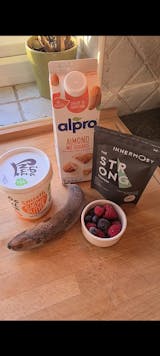Why does collagen matter?
When it comes to the benefits of collagen, they're pretty extensive. From improving skin elasticity, reducing signs of aging and even improving bone strength, collagen is a pretty important protein that plays a pretty integral role in the human body. As a result, collagen supplements can have a range of positive benefits both inside and outside the body. So we created our own.
Introducing The Glow Booster. Created with the aim of targeting your skincare and health from the inside out, The Glow Booster maximises your nutrition to ensure you're getting everything you need to keep your skin hydrated, fresh and radiant.
We know you'll love it, but let's take you through the 4-1-1...
Collagen supplementation: is it for you?
Do you want younger, fresher, brighter looking skin? Stronger bones and nails and pain-free joints? Boosted muscle mass and heart health? Whilst we're pretty sure you're thinking "obviously...", if the answer to these questions is ‘yes’, then it might be time to jump on the bandwagon and join the leagues of wellness fanatics on board the collagen trend.
The health and beauty communities love a new trend, especially when it’s something that claims to have age-defying properties in addition to a range of other benefits.
Collagen has done just that over the past few months, but if it sounds like just another wellness buzzword to you, don’t worry. We’re going to break down exactly what collagen is, what it does, what its health benefits are, and how you can start taking collagen supplements should you be convinced of its powers.

What is collagen?
Collage is the most abundant protein in the human body, and it in fact makes up about 80% of our skin. However it can also be found in the bones, muscles, tendons and ligaments. Collagen plays a vital role in a number of processes including providing structure and suppleness to the skin, helping your blood clot, easing pain in joints, building muscle, bone and cartilage, and more. In short, collagen is extremely important for helping your body complete some of its key processes.
To really dig deep into the science, it’s important to know that there are at least 16 different types of collagen.
The four main types are known as type I, II, III, and IV. Here’s what each of those does:
- Type I. This accounts for up to 90% of your body’s collagen, and is made of dense fibres that give structure to the skin, bones, tendons, connective tissues and teeth.
- Type II. This is made of more loosely packed fibres. It’s found in elastic cartilage which cushions your joints.
- Type III. This type supports the structures of the muscles, organs, and arteries.
- Type IV. This type helps with filtration and is found in the layers of the skin.
However, as we get older our bodies’ collagen production slowly declines, while things like sun exposure, smoking cigarettes, and pollution can also contribute to its breakdown, hence why many companies and brands have begun introducing collagen supplements into their repertoires. But despite the rapid rise of the collagen trend, it’s important to highlight that research about the effectiveness of taking these supplements is still in its early stages. While some research does support the claims that collagen supplements are beneficial to our overall health, the research remains very limited for the time being.
How do collagen supplements work?
Collagen supplements are a little different from the collagen that occurs naturally in the body. In supplements, you’ll find collagen peptides (also known as hydrolysed collagen) which are made of the same amino acids as collagen, but are more easily absorbed by the body. The reason for this is that they are much shorter chains of amino acids than regular collagen, therefore they’re more easily absorbed into the blood.
How can you take collagen supplements?
Most typically, people take collagen supplements in the forms of pills, powders, topical creams and liquids. Powders tend to be the most popular variety as they’re easy to add into our daily diets in smoothies, juices, coffee, tea, and even water.

However, there are certain foods and nutrients you can increase your intake of to get more collagen into your diet without having to take supplements themselves. All collagen starts off as procollagen. Our bodies make this by combining two amino acids - glycine and proline.
You can help your body produce more of this by ensuring you get enough of the following nutrients:
- Vitamin C. There are high concentrations of vitamin C in citrus fruits like oranges, but also peppers and strawberries.
- Glycine. This amino acid can be found in things like pork and chicken skin, gelatine, cheese, nuts and fish.
- Copper. This essential mineral is found in organ meats, sesame seeds, cocoa powder, cashews and lentils.
- Proline. This amino acid can be found in things like egg whites, dairy products, cabbage, asparagus, and mushrooms.
What’s the conclusion on collagen supplements?
While collagen supplements certainly can’t make all your problems go away, there is some evidence that with continued use they can help slow down signs of ageing in addition to easing joint pain and helping build muscle, bone and cartilage.
Make sure to always read the instructions on any products that you do try, and if you’re unsure make sure you consult your GP before taking anything.
Have you tried collagen supplements before? Head on over to @liveinnermost on Instagram and let us know.























